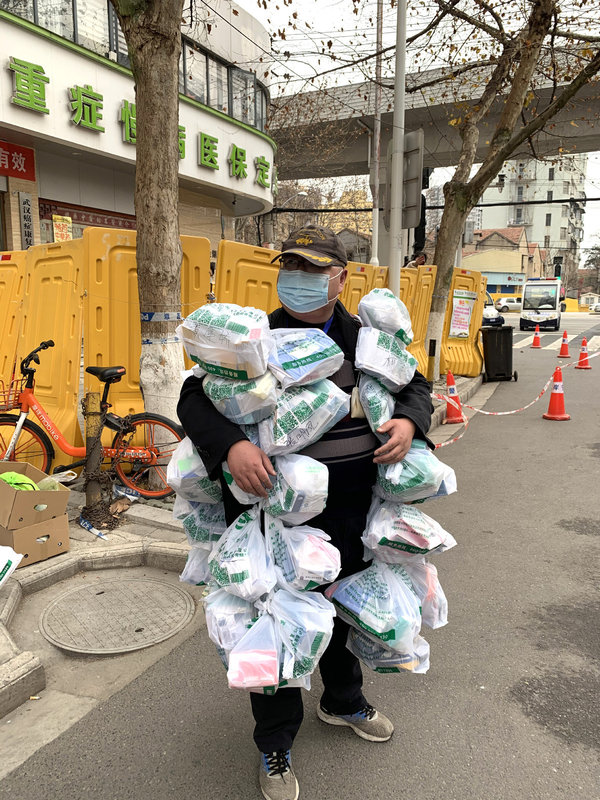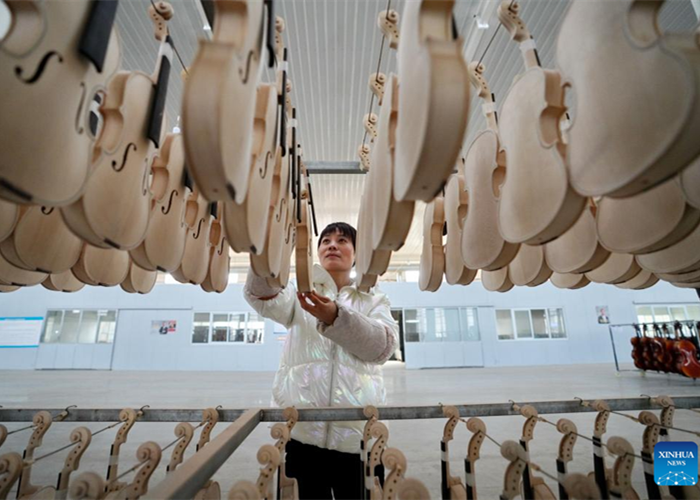Community Workers Vital for Victory Against Virus
 |
| Feng Feng carries bags of drugs he bought from a pharmacy in Wuhan, Hubei Province, on February 24, 2020. [Xinhua] |
Editor's note: Since the outbreak of the novel coronavirus, community workers have played an important part in curbing the spread of the virus. Here are some stories of community workers to get a sense of what these people have accomplished.
Feng Feng, a community worker, took the responsibility of buying essential medicine for those with chronic diseases in Huiminyuan Community in Wuhan's Jiang'an District starting from February. The photo has gone viral online.
Feng used to help record information about the novel coronavirus pneumonia, but he also got assigned a different task-buying and delivering drugs for patients with chronic diseases in his community.
"Most of the patients are elderly, and the drugs most in demand are those for treating diabetes and hypertension," Feng said.
"Sometimes I work more than 12 hours a day and have to go to more than 10 drugstores to get the needed drugs, but I still cannot buy all the drugs for them," he said.
Although many patients in the community asked him to buy a two-month supply of drugs at a time, Feng said that during each shopping trip he could only buy enough to last one month. Otherwise, he would not be able to carry them back to the community.
Li Deping, the head of Dazhancheng, a village in Central China's Henan Province, has been taking stern measures to help stem the public health threat amid the novel coronavirus outbreak.
"I shouted at villagers via loudspeaker on the night of the second day of Chinese New Year, since many people did not take the possible spread of the virus seriously," said Li, 57, who leads the village in the city of Xinxiang.
The video of him shouting through a loudspeaker has been widely circulated online after someone uploaded it, and lots of netizens have praised his efforts in the fight against the disease.
Li's public warnings to villagers to stay at home to reduce the risk of infection during the epidemic have struck a chord with communities nationwide, online and offline, with many residents giving him a thumbs-up.
Peng Jing, 33, a community worker with more than a decade of experience, faced her toughest challenge to date when the novel coronavirus pneumonia hit Wuhan, Hubei Province.
She has had less than five hours sleep a night as she has been busy organizing efforts to prevent and control the epidemic in the Shui'an Xingcheng Community in the city's Wuchang District, where she heads the neighborhood committee.
The community has 4,383 households and more than 11,000 people live there. "We have 11 community workers, which means that every one of us is responsible for around 400 households," Peng said.
Peng and her colleagues made door-to-door temperature checks, organized group purchases in line with residents' needs, and helped deliver daily necessities and buy medicine for people in the community.

Huang Juan (L) talks with her colleague about the daily work at their office in Huadong Community in Xingning District of Nanning, South China's Guangxi Zhuang Autonomous Region, February 26, 2020. [Xinhua]
After putting on a red uniform and a face mask at 8 am, Huang Juan gets ready to conduct a daily quarantine check on 400 households and shops in her community in Nanning, capital of South China's Guangxi Zhuang Autonomous Region.
For the past few weeks, she has done this each and every day. The necessary routine designed to curb the spread of the novel coronavirus disease, or COVID-19, was so arduous that Huang regularly topped the list for most steps per day on the pedometer app she uses.
Among her everyday items is a "resident roster" she uses to log the health condition of every household. Now, she has memorized most of the information.
Guangxi has more than 80,000 grid-based community workers like Huang.
Tian Guoliang is one of the 8,700 grid-based community workers of some 13,000 grids in Wuhan, the epicenter of the novel coronavirus outbreak in Central China's Hubei Province.
Grid workers have been striving to guarantee people's everyday needs by providing home delivery of necessities, as local residents have been isolated at home to prevent the spread of the virus since the city was locked down on January 23. Each worker takes care of 300 to 500 households.
Besides arranging volunteers to help deliver necessities for local residents, Tian also took charge of recording the body temperature of local residents from 500 households.
The delivery on March 4, along with the meat and vegetables bought by residents, included instant hot-dry noodles, the most favorite and typical local food.
(Source: chinadaily.com.cn)
Please understand that womenofchina.cn,a non-profit, information-communication website, cannot reach every writer before using articles and images. For copyright issues, please contact us by emailing: website@womenofchina.cn. The articles published and opinions expressed on this website represent the opinions of writers and are not necessarily shared by womenofchina.cn.








 WeChat
WeChat Weibo
Weibo 京公网安备 11010102004314号
京公网安备 11010102004314号